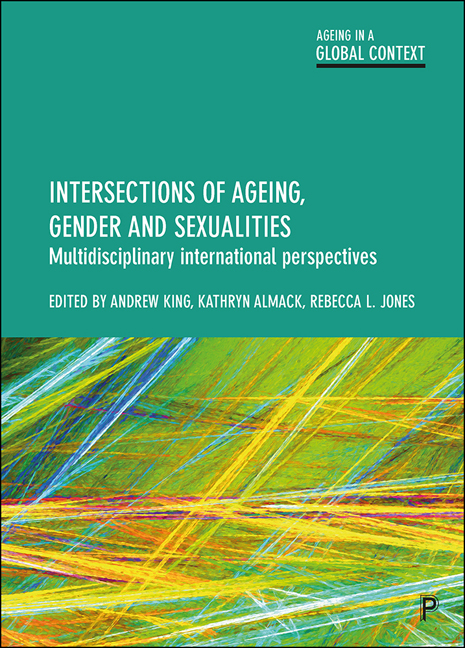fourteen - Intersecting identities of age, gender and sexual orientation in gay and bisexual men’s narratives of prostate cancer
Published online by Cambridge University Press: 27 April 2022
Summary
Intersectionality and health
Intersectionality is emerging as a key theoretical approach in health research, bringing a distinctive lens to understanding nuanced differences in health status, health experiences and health outcomes (Fish, 2008). This chapter draws on McCall's (2005) approach of intra-categorical complexity to examine the cross-cutting identities of age, gender and sexual orientation in the narratives of gay and bisexual (GB) men who took part in a study of their experiences of prostate cancer. Although McCall's (2005) typology of intersectionality has been widely cited (for example, Fish, 2008; Cronin and King, 2010; Monro and Richardson, 2010), I will first offer a brief overview. She identifies three approaches to intersectionality, which she conceptualises as anticategorical, inter-categorical and intra-categorical intersectionality. In brief, anti-categorical approaches, such as queer theory, seek to dismantle identity categories. The second approach, inter-categorical complexity has constituted the most common analysis of power and subordination across social groups characterised by privilege and penalty. While this approach has usefully identified the differential experiences between the principal categories of race or gender, it is often the case that other marginalised social groups are homogenised. The contingent, temporal and risky nature of GB men's experiences are reflected in the titles of papers: men face the challenge of prostate cancer as they age (Asencio et al., 2009), the threat of sexual disqualification (Ussher et al., 2017), sexual dysfunction (Hartman et al., 2014) and are reported to experience worse health-related quality of life (Hart et al., 2011).
This chapter contributes to the developing field of intersectional approaches to men's health (Griffith, 2012) by drawing on an intra-categorical approach which offers a fine-grained analysis of differences within social categories by exploring their complexity and nuance. Such an approach seeks to complicate and critically engage with identity categories to reveal multiple and often conflicting experiences of power and subordination, and derives meaning ‘from the partial crystallization of social relations in the identities of particular groups’ (McCall, 2005: 1781).
In the next section of the chapter, I consider the wider social context to enable exploration of how the intersections of age, gender and sexual orientation may affect the lives of GB men and influence their lived reality of prostate cancer.
- Type
- Chapter
- Information
- Intersections of Ageing, Gender and SexualitiesMultidisciplinary International Perspectives, pp. 223 - 240Publisher: Bristol University PressPrint publication year: 2019



